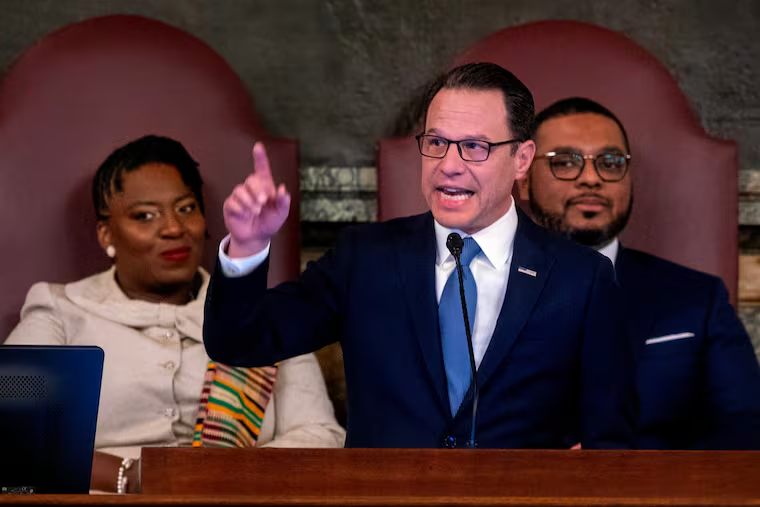Pennsylvania public schools are failing — and more money won’t help
Pennsylvanians are hungry for alternatives to throwing money at failing schools, and lawmakers have all the ingredients they need to feed everybody.

Imagine bringing home a report card full of Ds and Fs. How would your parents react? Also, would this be a good time to ask for a raise in your allowance? Sadly, this is what’s happening with Pennsylvania public education.
Every two years, the U.S. Department of Education assesses public schools nationwide and publishes the National Assessment of Educational Progress, or the Nation’s Report Card, findings. The January release shows Pennsylvania schools aren’t making the grade: About 7 in 10 Pennsylvania eighth graders cannot read or perform math at grade level.
This academic crisis is even more dire in Philadelphia, where 82% of eighth graders cannot read at grade level, and 85% aren’t proficient in math. Nearly half of the state’s lowest-achieving schools are in the Philadelphia School District.
Parents and voters have taken note. When asked to grade the state’s public schools, two-thirds of Pennsylvanians responded with a “C” or below, according to recent polling.
Yet, despite these abysmal assessments, Pennsylvania public education will see more no-strings-attached funding. As he does every year, Gov. Josh Shapiro promised increased funding for basic education during his Feb. 4 budget address. Interestingly, the governor also proposed funding higher education based on a “performance-based formula.” If public colleges must meet performance criteria for funding, why not the same for public K-12 schools?
But money isn’t the issue. Pennsylvania spends about $22,000 per student — more than $4,000 higher than the national average. The Keystone State ranks seventh nationally in education funding. In the last four years, lawmakers added more than $4 billion in new annual funding for public K-12 education.
Meanwhile, statewide enrollment continues to plummet. Pennsylvania public schools now educate 140,000 fewer students than in 2000. The Pennsylvania Department of Education projects these schools to lose another 60,000 students by 2028. Meanwhile, in the last five years, homeschooling jumped by 60%, and charter school enrollment grew by 12%.
Pennsylvanians are hungry for alternatives. Fortunately, lawmakers have all the ingredients they need to feed everybody.
Lawmakers can start by expanding the state’s tax credit scholarship programs. The Educational Improvement Tax Credit (EITC) and Opportunity Scholarship Tax Credit (OSTC) programs provide millions in scholarships to tens of thousands of Pennsylvania students. These programs empower low- and middle-income students with the financial support they need to find a school that fits their needs.
However, demand for these scholarships outpaces supply. In fiscal year 2023, right-to-know requests reveal that while EITC and OSTC awarded nearly 85,000 scholarships, state caps denied almost 80,000 applications. Lawmakers must address the arbitrary program caps that limit these scholarships.
Lawmakers could also enact new measures. The Lifeline Scholarship Program would provide millions in funding to students attending Pennsylvania’s lowest-performing schools. In addition to Lifeline Scholarships, lawmakers could codify a refundable tax credit to offset educational expenses, such as tuition, tutoring, or books. Both policies would offer immediate relief to Pennsylvania students stuck in the commonwealth’s worst schools.
Not all policy solutions require funding. Currently, zip codes determine the schools students must attend. Lawmakers could adopt statewide open enrollment that breaks up this monopoly, freeing students and families to find and enroll in better schools outside their immediate neighborhood.
Fortunately, all these policies have public backing. Recent polling shows 8 in 10 Pennsylvanians support expanding EITC and OSTC, enacting Lifeline Scholarships and a refundable tax credit, and adopting open enrollment statewide. Educational reform is a win-win situation: Politicians deliver politically popular ideas while they, more importantly, save kids from failing schools.
Our educational crisis boils down to incentives. Year after year, Pennsylvania public education fails to provide a quality education for youth statewide. Yet, lawmakers reward this shameful record with more funding without added accountability. Rather than throwing more money at the same problem, Shapiro and the General Assembly must empower Pennsylvania kids and families with the freedom to find a school of their choice.
David Hardy is president of Girard College and a distinguished senior fellow at the Commonwealth Foundation.